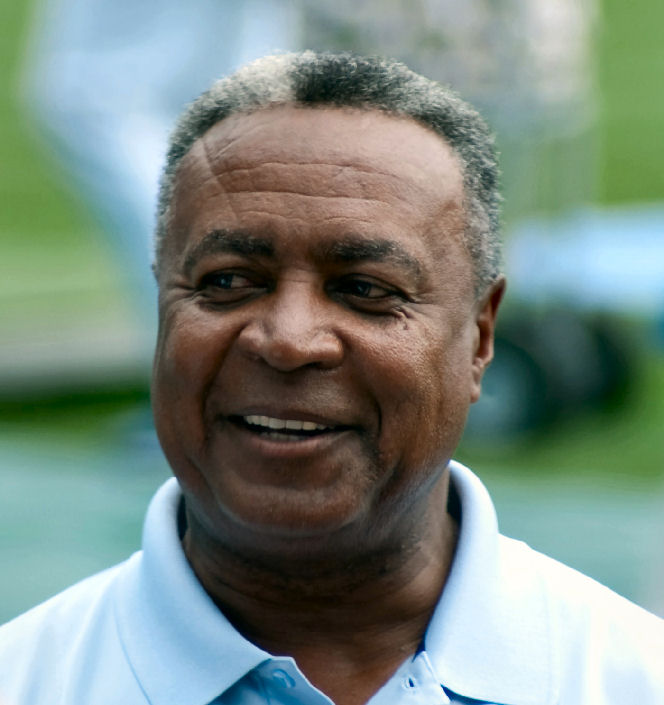Frank White

8 time Gold Glove 2nd Baseman for the K. C. Royals, Jackson County Executive
Topic Categories:
Fee Range: Contact Speaker Exchange Agency
8 time Gold Glove 2nd Baseman for the Kansas City Royals, World Series Champion, Marketing Executive for Blue Cross Blue Shield, Jackson County Executive
*Fee ranges are presented as a guideline only. Speaker fees are subject to change without notice. For an exact quote, please contact your Speaker Exchange Agency representative.
Frank White could always see the Kansas City A’s play while he was growing up at 29th and Olive Streets. That was about a mile from Municipal Stadium, at 22nd and Brooklyn. Frank passed the ballpark every day on his way to Lincoln High School.
Sometimes his father would take him to a game on Sunday afternoons. But there was always another way to catch some baseball. The high school was on a hill overlooking the stadium, and its bleachers were well-placed.
“I was playing on a team that practiced at 15th and Woodland at the Parade Park and so we’d just collect pop bottles and stuff on the way back to the stadium,” White said. “We’d stop at Leo’s Drug Store — back then, they had Vess Cola bottles — and you’d get about five cents for a bottle. Arthur Bryant’s was next to the drugstore, and we’d put out money together and have enough to buy just fries and a big bottle of cola. We’d go up and sit in the bleachers until 10 o’clock at night and then go home.”
From the hill, White and his buddies were able to see a historic event in 1965. Satchel Paige pitched three shutout innings for the A’s, allowing the Boston Red Sox only one hit — by Carl Yastrzemski. That made Satch, at age 59 (or more), the oldest pitcher in Major League history. “And we got to see the up-and-coming stars for the A’s like Reggie Jackson and Joe Rudi and Rick Monday and Blue Moon Odom before the team left,” White said.
White credits his late father, Frank White Sr., for steering him in the right direction in baseball and in dealing with racism. “When you’re born in Mississippi and you spend a lot of summers there going to summer school — I mean, racism was huge. It was everywhere [you’d] go. You had to say, ‘Yes, sir,’ and ‘No, sir.’ You had your colored restrooms, your white restrooms, your colored water fountains. It was one of those deals where they explained that this is just the way it is and you couldn’t change it at that point,” White said.
“Even here in Kansas City, you could go downtown to Grant’s and some of the department stores that had (lunch) counters and they wouldn’t let us sit at the counters in those places either. I don’t think racism is ever going to go away. I always look at it as he who has the gold makes the rules and you just try to figure out how to make it work for yourself.”
White was born in Greenville, Miss., but his father moved the family to Kansas City when he was about 5 years old. “His whole focus was to keep us out of trouble. So that’s why when we got old enough, he’d send us back to Mississippi for the summer because you could get into more trouble here. Down there you were on a 20-acre farm with your grandparents and you’re picking cotton and slopping hogs and gathering eggs,” White said. “And you had an outhouse, not a real bathroom.”
When White was playing baseball as a kid, his father kept a sharp eye on him. He’d pitch to him and play catch. “But when I was 12 years old, a thing he did made more sense to me later although it didn’t at the time. Back then when you’re playing on the best team, you just want to win, you want the trophy,” White said.
“Playing wasn’t really one of those things that was on my mind. I guess after about the third game I hadn’t played, he just took me off the bench one day and took me home. I was 12 and crying and wondering what the heck he’s doing. Finally I asked him, ‘Why did you take me off the team?’ And he said, ‘Because you’re not learning anything. If you want to learn how to play baseball, you have to play. You have to learn something about the game and get to like the game.’ He put me on the worst team. We didn’t win any games, but I played every day.”
A few years later, White went to a tryout at Municipal Stadium and won a spot in owner Ewing Kauffman’s experimental Royals Baseball Academy in Florida. “We went to Sarasota in August 1970, and the Academy wasn’t quite ready yet and they wanted to put us up at a Sarasota hotel and [the hotel] really didn’t want any non-whites staying there at that time,” White recalled. “So there was a little to-do about that and then finally they got us in. The Academy was ready, I believe, a few weeks after that.”
Special instructors came into the Academy — the Royals’ Cookie Rojas gave infield instruction, Amos Otis taught the fundamentals of playing the outfield and famous runner Wes Santee showed the students how to have good running form. “I remember Ted Williams came down and talked to us one time about hitting, and he said everybody should have a slight up in their swing — so everybody was swinging like Ted Williams,” White recalled. “Then Jim Lemon came in and everybody was Jim Lemon. Then Mickey Vernon came in and everybody was like Mickey Vernon.” There were hand-eye coordination tests and all sorts of drills. “You just felt like a guinea pig,” he said.
From there, he started a quick three-year trek up the minor league ladder. White doesn’t remember any race issues. “I really didn’t have any problems at all,” White said. “The only thing I had to fight coming through the minor leagues was that I was an Academy player and everybody felt Mr. Kauffman was giving me everything because he wanted the Academy to work.”
In 1973, White became the first Academy graduate invited to Major League Spring Training. He was called up on June 12 that year. After spending most of his first 2 1/2 seasons in a backup role, White became the regular second baseman in 1976. White spent his entire playing career with the Royals. He won eight Gold Gloves, hit .545 in the 1980 AL Championship Series, led the Royals with six RBIs in the 1985 World Series victory, and was an All-Star five times.
“You have to be pretty fortunate to be able to have your dad and your mom see you play pretty much every game. The only times he missed games were on the weekends because that’s when he did his fishing,” White said. “But he’d stand up on that rail behind the on-deck circle every night and he had an entourage up there — 10 or 15 people. They rubbed the railing shiny so they put a pad up there for them and they called themselves the ‘Rail Boys.’ ”
White once asked his father why he didn’t sit down. “He said, ‘Well, I sat down one time and a guy poured beer down my back. I don’t want to be fighting in the stands so I just started standing up.'”
Want to bring Frank White to your next event? Please tell us a little about your event, and we will get back to you shortly!




